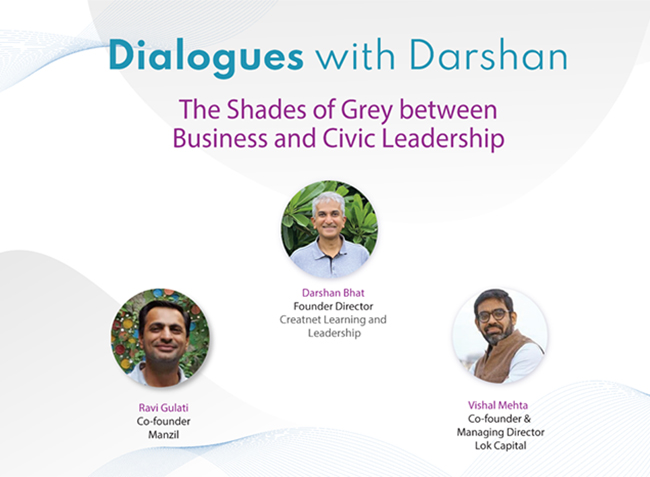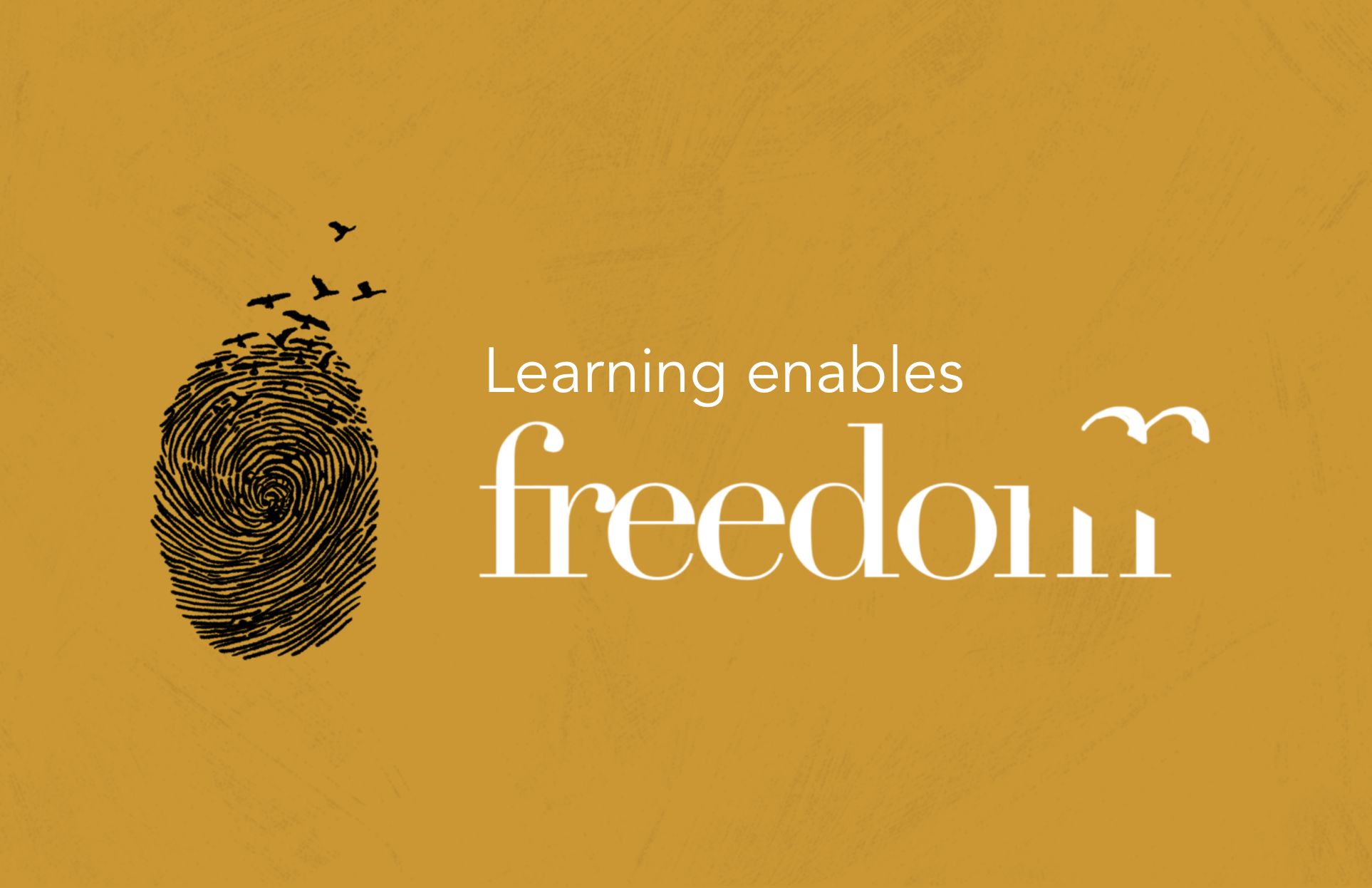Our Blog
The shades of grey between civic and business leadership

Business leaders have recognised that business and socially responsible decisions are not mutually exclusive; Business and civic leadership are very closely tied together. What is also true is that not for profit ventures cannot survive without achieving financial sustainability as well. This implies that the intersection of commercial success and social impact takes place at varying levels and degrees.
In our event, Dialogues with Darshan we explored shades of grey between business and civic leadership, with Vishal Mehta co-founder & Managing Director at Lok Advisory Services, that advise the funds of Lok Capital, and Ravi Gulati co-founder of Manzil and a graduate from IIM-A. Vishal and Ravi gave us a fresh perspective on the confluence of business and civic leadership. Darshan’s questions led to an emergence which gave perspective to questions such as ‘what it means to make business meaningful, the importance of making business impactful with people, and learning about grey thinking’, to name a few. In this article, we will look at these questions.
What does it mean to make business meaningful?
We tend to view CSR as the single way to create a meaningful business, however, Vishal brought in an augmented perspective. Corporate social responsibility (CSR), is a self-regulation concept in which a business has a responsibility to do good. When it comes to making business meaningful this method can be considered to result in ineffectiveness.
Vishal believes that one can’t do meaningful work or create social impact only the CSR way. A business shouldn’t make money anyhow on one end and then attempt to do something socially responsible somewhere else, he adds. This thought fails the complete idea of bringing the social and commercial world together. Rather he encourages the idea of innovating the working model itself to generate social impact. Vishal feels that the integration of socially responsible decisions and business decisions lies at the heart of creating a meaningful business. For instance, any brand or organisation that feels dearly about minimising waste must try to create processes and systems in-house first, as opposed to just contributing towards that cause through CSR.
“In some ways, you can make every business very impactful, but unless that is coming from a stronger motivation, you will figure out a way to compromise.” – Vishal Mehta
Vishal is making his business meaningful by innovating his firm’s working model. Lok Capital decided to keep 50% of its generated profits aside for experimental investments. These investments are directed towards businesses that require taking a higher risk for much lower returns.
Ravi furthers Vishal’s thoughts by pointing out that as a people we are wired to not only look for commercial success but also seek out meaning and purpose within ourselves. Ravi feels that people are an integral part of any business. Both Ravi and Vishal strongly recommend that cultivating honest connections in a business and investing in the community of people who drive that business is at the core of creating impact.
Why is it important to invest in people and honest relationships?
Vishal Mehta specifies that one should always prioritise investing in people when it comes to business. He recommends investing in people-centric businesses. He further adds, that ‘how’ something is done is always people-driven and not just business model-driven.
“Surround yourself with sensible people who ask the right questions.” – Vishal Mehta
Darshan and Ravi agree with how one should attempt to steer away from dishonest relationships in life. While Ravi adds, how when we stay in the same space for a long time we tend to meet interesting people and gravitate towards them.
“Honest relationships keep you in balance and check.” – Ravi Gulati
Surrounding oneself with good people has a positive influence on you and the work you do. People who ask the right questions, are given the comfort by you of having an honest relationship with them. Honest relationships can help maintain balance in a person’s life and keep their feet grounded.
Ravi goes back to the idea of profit maximisation and how in the commercial sense it is perceived as binary. In the context of business, we focus on the binary aspects of profit or no profit whereas we can instead find a place of balance i.e strive for ‘profit optimisation’.
How does one break away from binary thinking?
Attaining balance can mean different things to different people; The notion of balance is dynamic and ever-changing for everyone. In that respect, grey thinking is about striking a balance and breaking away from ‘this or that’ patterns in our life. Grey or non-binary thinking means that we are not attaching any opinions or judgement to our observations.
“Our mind is taught to think in a binary way right from childhood, to see everything as opposites or black and white. Whereas in reality, these clear categories don’t exist. “ –
Ravi Gulati
Life is much more complex and it consists of shades of grey. Various concepts and thoughts help make or break binary thinking.
In that sense, both Ravi and Vishal felt that binary thinking is limiting. If we open up our minds to the grey areas or grey thinking, it will enrich us to use the appropriate mental model to be applied to each situation. This will also allow us to be open-minded in integrating different opinions or viewpoints on carving meaning, impact and balance in civic and business contexts. Additionally, how it is critical to evolve one’s thinking in order to lead a for-profit or non-profit organisation effectively.
Finally, Ravi leaves us with a story of hope about a parrot that is trying to extinguish a forest fire on its own. He compels us to think about ‘what can I do’, and turns the frame towards oneself to act and reflect rather than waiting on external support to come by.
Darshan’s Questions
How do you measure success?
What’s shaped your thinking?
How do you look for the intention (in or at work)?
What’s your experience with choosing where you spend your time and with whom do you spend your time?
What practices help you connect to yourself, make meaning of things, and spread it?
Catch the event highlights on Creatnet’s youtube channel, titled Dialogues with Darshan: The Shades of Grey between Business and Civic Leadership
Suggested Blogs

Action Committees: A Micro Paper
What is an action committee? An action committee is a group of people within a department or different departments who work together temporarily (for a stipulated period of time or…
Learning Enables Freedom - Independence Day, August 15th Event
On this Independence Day, August 15th, as we approach our 75th year of independence, leaders from organisations, non-profit institutes, government school systems, and youth leaders from our Youth Leaders Program…


